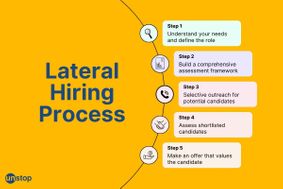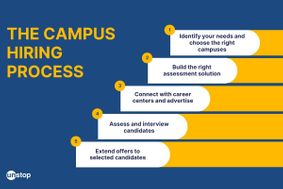- Understanding Employee Relocation
- Benefits for Employees and Employers
- Key Elements of Relocation Programs
- Challenges in Employee Relocation
- Legal Considerations in Relocation
- Role of HR in Relocation
- Plan B? Alternatives for Employee Relocation
- Outsourcing Relocation Services
- Final Remarks
- Frequently Asked Questions
Employee Relocation: Benefits, Challenges, And Key Elements To Consider

Did you know that nearly 20% of employees relocate for work each year? Employee relocation is a game-changer for companies and workers alike. It opens doors to new opportunities, enhances career growth, and boosts company performance. Understanding the ins and outs of relocation can make a significant difference in employee satisfaction and retention. This article will dive into the benefits, challenges, and strategies for successful employee relocation.
Understanding Employee Relocation
Employee relocation refers to the process of moving an employee from one location to another for work. This often involves a relocation package, which is a set of benefits provided by the employer. These packages can cover moving expenses, temporary housing, and even assistance in selling or buying homes. Companies use these packages to attract talent and support employees during transitions.
Common reasons for employee relocations include:
- Job Promotions: Moving closer to corporate headquarters or new projects.
- Skill Gaps: Filling skill gaps in different locations.
- Mergers and Acquisitions: Consolidating operations.
- Personal Growth: Seeking opportunities in different cities for lifestyle changes.
Each of these reasons highlights how relocation can benefit both employees and employers by aligning personal and organizational goals.
Benefits for Employees and Employers
Career Development
Relocation often opens new career development opportunities. Employees can gain access to advanced training programs. They also have the chance to work with experienced professionals in different locations. This exposure enhances their skills and knowledge.
Quality of Life
Moving can significantly improve an employee's quality of life. Many companies offer relocation bonuses that help cover moving expenses. Employees may find better housing, schools, and healthcare options in a new area. These factors contribute to overall satisfaction and well-being.
Talent Attraction
Companies that support employee relocation attract top talent. Many skilled workers seek employers who provide benefits like relocation assistance. By offering these incentives, businesses can build a more diverse workforce. This diversity leads to innovative ideas and solutions.
Business Growth
Employee relocation directly impacts business growth. When employees move to strategic locations, it helps companies expand operations. Businesses can enter new markets more effectively. Relocation fosters collaboration among teams, leading to increased productivity and success.
Also Read:
Key Elements of Relocation Programs
Policy Development
Effective relocation programs begin with clear policy development. Employers must define what the program includes. This could cover financial assistance, housing options, and support services. A comprehensive relocation program outlines eligibility criteria and benefits. It ensures employees understand their options and responsibilities.
Moving and Housing
Moving logistics are crucial in any relocation program. Companies should partner with reliable moving companies. They often provide packing, transportation, and unpacking services. Assistance with housing is vital. Employees may need help finding temporary or permanent homes. Offering resources like local real estate agents can ease this process.
Travel Costs
Travel costs can add up quickly during employee relocation. Employers should consider covering expenses such as airfare, mileage, and lodging. Providing a clear reimbursement process helps employees manage their finances during the transition. This support shows commitment to their well-being.
Family Support
Family support is a key aspect of successful employee relocation programs. Relocating can be stressful for families, especially children. Employers should offer resources such as school search assistance or childcare options. Providing counselling services can also help families adjust to their new environment.
Challenges in Employee Relocation
Financial Strain
Managing employee relocation often involves significant costs. Companies must consider relocation expenses such as moving services, temporary housing, and travel fees. These costs can add up quickly. Many companies offer employee relocation packages to ease this burden. However, not all packages cover every expense. This can lead to financial strain for employees who may have to pay out of pocket.
Cultural Adjustment
Relocating employees face challenges beyond finances. They must adapt to new cultures and environments. This adjustment can be stressful and impact job performance. Employees may feel isolated or overwhelmed in unfamiliar settings. Organizations should provide resources to help with this transition. Offering relocation opportunities that include cultural training can enhance the successful employee relocation experience.
Communication Issues
Effective communication is crucial during relocations. Misunderstandings can arise if expectations are not clearly outlined. Employees need detailed information about their roles and benefits in the new location. Companies should establish open lines of communication throughout the relocation process. Regular check-ins can address concerns and foster a sense of support.
Legal Considerations in Relocation
Employment Laws
When relocating employees, employers must adhere to a range of employment laws. These laws vary across states and regions within India and include provisions related to worker rights, notice periods, and termination procedures. Employers must ensure that they provide adequate notice to employees before relocation and adhere to any statutory requirements to avoid legal complications.
Tax Implications
Relocating employees within India or internationally involves intricate tax implications. Employees might encounter tax liabilities in both their original and new locations. Indian employers should be aware of how moving expenses are treated under Indian tax laws, as well as any relevant international tax treaties.
Certain relocation costs may be deductible, while others may not be. Consulting with a tax professional is crucial to navigate these regulations effectively and ensure compliance with the Income Tax Act, 1961, and other applicable tax laws.
Visa and Immigration
For international relocations, understanding visa and immigration rules is essential. Indian employers must ensure that their relocating employees secure the appropriate work visas for the destination country. This process can be complex and time-consuming, requiring specific documentation and adherence to various country-specific regulations.
For instance, countries like the United States have stringent requirements for H-1B visas, while the United Kingdom requires Tier 2 visas for skilled workers. Properly managing visa and immigration processes helps avoid delays and legal issues, ensuring a smooth transition for employees.
Role of HR in Relocation
Planning and Coordination
HR plays a crucial role in planning employee relocations. They create timelines for the move. This includes setting deadlines for packing, travel, and settling in. HR also coordinates with various departments. They ensure that all aspects of relocation are covered. This may involve working with legal teams to address any compliance issues discussed previously.
Policy Implementation
Implementing relocation policies is another vital task for HR departments. Policies should outline the benefits available to relocating employees. These might include financial assistance for moving costs or temporary housing allowances. Clear communication of these policies is necessary. Employees need to understand what support they can expect.
HR must regularly review and update these policies. Changes in laws or company strategy can affect relocation practices. The goal remains consistent: facilitate smooth transitions for employees while ensuring compliance with legal standards.
Employee Support
Support for employees is essential during relocation. HR provides resources to help them adapt to new environments. This can include information about housing, schools, and local services. HR often organizes orientation sessions. These sessions familiarize employees with their new location. Access to counselling services may also be offered to ease the transition.
Convincing An Employee For Relocation - A Basic Conversation Starter
HR: Hi, I wanted to talk to you about a potential opportunity that's opened up at our Mumbai office.
Employee: Mumbai? That's quite a jump from Delhi.
HR: I know, and it's a big decision, but we see you as a valuable asset to the team there. This role would involve [explain the role and responsibilities]. It's a challenging but rewarding position that aligns perfectly with your skillset and career goals.
Employee: It does sound interesting, but I'm not sure. I am quite comfortable in Delhi.
HR: I understand. Relocating can be a big adjustment, but we want to make this transition as smooth as possible. We're offering a competitive relocation package that includes [list benefits, such as housing assistance, relocation allowance, etc.]. We'll also provide support with finding schools for your children, if applicable, and connecting you with colleagues in Mumbai.
Employee: That's good to know. I'm concerned about my family adjusting to a new environment.
HR: We understand that family is important. We can arrange for a visit to Mumbai before the move so you and your family can get a feel for the city. We also have employee resource groups that can provide support and guidance.
Employee: I'll need some time to think about it.
HR: Absolutely. This is a big decision, and we want you to feel confident in your choice. I'm available to answer any questions you have and provide additional information.
Plan B? Alternatives for Employee Relocation
Relocating employees can be costly and disruptive for some companies. Here are some strategic alternatives:
Flexible Work Arrangements
- Remote work: Enable employees to work from a location of their choice.
- Hybrid work model: Combine remote and in-office work.
- Flexible hours: Allow employees to adjust their work schedules to accommodate personal commitments.
Talent Acquisition Strategies
- Local hiring: Prioritize candidates residing near the job location.
- Virtual onboarding: Utilize technology to integrate remote employees seamlessly.
- Talent pools: Build a pool of qualified candidates in the desired location for future opportunities.
Project-Based Assignments
- Temporary assignments: Deploy employees for specific projects without permanent relocation.
- Rotation programs: Implement rotational assignments for skill development and exposure.
Technology-Driven Solutions
- Virtual collaboration tools: Leverage technology for effective communication and teamwork.
- Digital workplace platforms: Create a unified digital workspace for remote employees.
Compensation and Benefits
- Remote work stipends: Provide financial assistance for home office setup and utilities.
- Flexible benefits packages: Offer options to accommodate different employee needs and lifestyles.
By implementing these alternatives, organizations can reduce relocation costs, improve employee satisfaction, and expand their talent pool.
Outsourcing Relocation Services
Benefits of Outsourcing
Outsourcing relocation services can simplify the process for companies. It allows businesses to focus on their core operations while experts handle logistics. Relocation assistance companies streamline tasks like home searches and moving coordination. This reduces stress for employees during transitions. A relocation expert knows local markets and can negotiate better deals.
Outsourcing also improves employee satisfaction. When workers feel supported, they are more likely to embrace job relocation packages. This leads to higher retention rates and productivity.
Choosing Providers
Selecting the right employee relocation company is crucial. Companies should evaluate providers based on their experience and service offerings. Look for those with positive reviews in the relocation industry. It’s important to understand the range of services offered, such as temporary housing or cultural training.
Potential clients should request proposals from multiple organizations. Compare each company's relocation packages and pricing structures. A thorough assessment helps ensure that the chosen provider aligns with corporate needs.
Cost-Benefit Analysis
Conducting a cost-benefit analysis is essential when considering outsourcing. Evaluate both direct costs and potential savings associated with employee relocation services. Analyze whether outsourcing will reduce overhead expenses or improve efficiency.
Investing in a reliable relocation management team can yield long-term benefits. While initial costs may seem high, improved employee satisfaction can lead to reduced turnover costs and increased productivity.
Final Remarks
Employee relocation is a complex yet vital process that can significantly impact both your workforce and business outcomes. Understanding the benefits, challenges, and legalities involved equips you to create effective relocation programs. By addressing these elements, you not only enhance employee satisfaction but also drive organizational success.
Now’s the time to evaluate your current relocation strategies. Are they meeting your employees’ needs? Consider refining your policies or outsourcing services to streamline the process. Investing in a robust relocation plan can boost morale and retention and ensure your relocation efforts are as effective as possible.
Frequently Asked Questions
Q1. What is employee relocation?
Employee relocation involves moving an employee from one location to another, often for work purposes. It can include assistance with moving expenses, housing arrangements, and settling into the new area.
Q2. What are the benefits of employee relocation?
Relocation can enhance career opportunities, improve job satisfaction, and foster personal growth for employees. For employers, it helps retain talent and fills critical positions in different locations.
Q3. What should a relocation program include?
A comprehensive relocation program should cover financial assistance, housing support, logistical arrangements, and resources for acclimating to the new environment. Tailoring these elements to individual needs is crucial.
Q4. How can HR support employee relocation?
HR plays a vital role by coordinating logistics, providing resources, and offering emotional support. They ensure that the process is seamless and addresses the needs of both the company and the relocating employee.
Q5. Should companies outsource relocation services?
Outsourcing can streamline the process by leveraging expertise and resources from specialized firms. This allows companies to focus on core operations while ensuring a smooth transition for employees.
Suggested Reads:
As a biotechnologist-turned-writer, I love turning complex ideas into meaningful stories that inform and inspire. Outside of writing, I enjoy cooking, reading, and travelling, each giving me fresh perspectives and inspiration for my work.
Login to continue reading
And access exclusive content, personalized recommendations, and career-boosting opportunities.
Subscribe
to our newsletter
Blogs you need to hog!

Organize Hackathons: The Ultimate Playbook With Past Case Studies

What is Campus Recruitment? How To Tap The Untapped Talent?

Lateral Hiring: A Complete Guide To The Process, Its Benefits, Challenges & Best Practices










Comments
Add comment